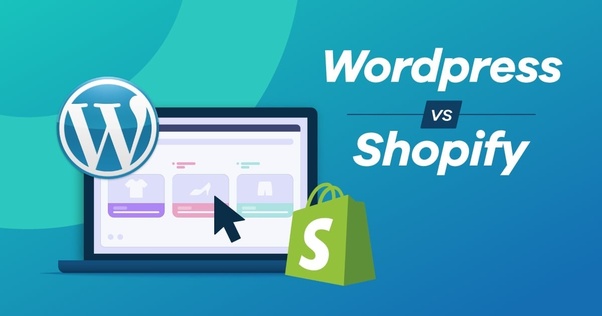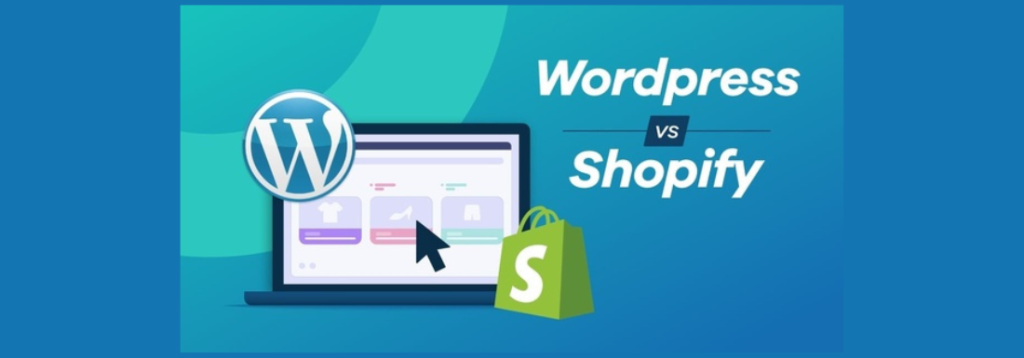In the fiercely competitive world of ecommerce, selecting the ideal platform for your online store is a make-or-break decision. Two industry titans, Shopify and WordPress, are frequent contenders. While both offer solutions for selling products, Shopify leans towards ease of use and a closed ecosystem. However, for businesses prioritizing long-term growth, search engine optimization (SEO) prowess, and complete creative control, WordPress emerges as the stronger choice. Dive deeper to discover Why WordPress is better than Shopify?

Overview of WordPress and Shopify:
WordPress stands as a beacon of flexibility and customization in the digital landscape. As an open-source content management system, it offers unparalleled freedom to tailor your website to your exact specifications. From themes to plugins, WordPress empowers users to create unique online storefronts that resonate with their brand identity.
On the other hand, Shopify positions itself as a user-friendly, all-in-one e-commerce platform. With its intuitive interface and built-in features, Shopify simplifies the process of setting up and managing an online store. From product listings to payments, Shopify streamlines the e-commerce experience for businesses of all sizes.
Shopify vs WordPress:A Comparison
In the bustling world of e-commerce, the choice of platform can determine the trajectory of your online business. Two heavyweights in this arena are WordPress and Shopify. While both have their strengths, today, we’ll delve into Why WordPress is better than Shopify? Below are some points describing the pros and cons of both platforms.
1. Content is King (and Queen of Sales):
- Shopify’s Focus: Primarily a sales platform, Shopify offers limited content management capabilities. Adding blog posts or informative product descriptions can be clunky.
- WordPress’s Strength: Built on the foundation of content management, WordPress empowers you to create SEO-rich blog posts, landing pages, and detailed product descriptions. This fosters organic traffic through search engines, a sustainable growth strategy.
Example: Imagine you are a website development company . With WordPress, you can create blog posts like “Top 5 ecommerce website development company ” or “Top 100 web development companies in India.” These informative pieces attract potential customers searching for related topics and establish you as an authority, driving traffic to your product pages.
2. SEO Finesse: Fine-Tuning for Search Engine Love
- Shopify’s Limitations: While Shopify offers basic SEO tools, customization is restricted. You have less control over meta descriptions, title tags, and URL structures – crucial elements for search engine ranking.
- WordPress’s Advantage: WordPress grants extensive SEO control. Plugins like Yoast SEO help optimize titles, meta descriptions, and images for targeted keywords. You can also create custom URLs that are user-friendly and search engine optimized.
Example: A well-optimized WordPress site allows you to target long-tail keywords relevant to your products. For instance, instead of just targeting “website” you can target “web development company in Bangalore.” This increases the chance of your product pages ranking higher in search results for specific searches.
3. Owning Your Data, Owning Your Success
- Shopify’s Control: With Shopify, your store exists within their ecosystem. While they offer data exports, full data ownership is limited.
- WordPress’s Freedom: WordPress gives you complete control over your website’s data. You can export, analyze, and leverage customer data for informed marketing decisions. This empowers you to build long-term customer relationships.
Example: By owning your customer data on WordPress, you can segment your audience and create targeted email marketing campaigns based on purchase history or browsing behavior. This personalized approach fosters customer loyalty and repeat business.
4. Scalability: Growing Beyond Products
- Shopify’s Scope: Designed for selling products, Shopify becomes cumbersome if you want to expand into content creation or build a robust online community.
- WordPress’s Flexibility: WordPress seamlessly integrates with various plugins, allowing you to add functionalities beyond just an online store. You can create a membership area, host online courses, or integrate a forum to foster customer engagement.
Example: As your business grows, you might want to offer educational resources or build a loyal community around your brand. With WordPress, you can easily add these features, creating a comprehensive online experience for your customers.
5. Customization Reigns Supreme: A Store That Reflects Your Brand
- Shopify’s Templates: While Shopify offers themes, extensive customization is limited. Your store might end up looking similar to others using the same theme.
- WordPress’s Design Freedom: WordPress offers endless customization options. You can choose from thousands of themes, or even build a custom theme that perfectly reflects your brand identity.
Example: Imagine selling digtal marketing services. With a custom WordPress theme, you can create a warm and inviting online space that showcases the personality behind your brand. This emotional connection resonates with customers and fosters brand loyalty.
Beyond the Five: Additional Advantages of WordPress
- Cost-Effectiveness: While Shopify has monthly fees, WordPress offers a freemium model with affordable hosting options. This makes it a budget-friendly choice for startups and growing businesses.
- Open-Source Community: The vast WordPress community provides extensive support, tutorials, and plugins. This allows you to find solutions and troubleshoot challenges more easily.
- Security: A well-maintained WordPress site can be just as secure as a Shopify store. Regularly update plugins, themes, and the WordPress core to ensure robust security.
Main Advantages and Disadvantages of Shopify:
Advantages:
- User-friendly interface.
- Built-in hosting and security features.
- Dedicated customer support.
Disadvantages:
- Limited customization options.
- Monthly subscription fees.
- Dependency on Shopify’s ecosystem.
Main Advantages and Disadvantages of WordPress:
Advantages:
- Unlimited customization possibilities.
- Cost-effectiveness.
- Extensive plugin ecosystem.
Disadvantages:
- Requires more technical knowledge for setup and maintenance.
- Responsibility for security and updates.
Choosing the Right Platform: It’s All About Your Goals
While WordPress offers numerous advantages for SEO-conscious businesses, Shopify excels in ease of use and caters specifically to online stores. If you’re a beginner with a limited product range, Shopify might be a good starting point. However, for long-term growth, SEO dominance, and complete creative control, WordPress reigns supreme.
Conclusion:
In conclusion, the decision between WordPress and Shopify boils down to understanding your business’s unique needs and goals. While WordPress offers unparalleled customization options, cost-effectiveness, and scalability, Shopify provides simplicity, ease of use, and built-in features tailored for beginners and small businesses. To make an informed choice, consider factors such as customization flexibility, scalability, cost-effectiveness, and integration capabilities. And remember, whether you opt for the versatility of WordPress or the convenience of Shopify, the team at Websenor is here to provide expert guidance and support every step of the way. With our experience and expertise, we can help you build and grow your online store to reach new heights of success in the ever-evolving digital landscape
FAQs (Frequently Asked Questions):
- “Which platform is better for beginners?”
- WordPress offers more flexibility and customization options, making it ideal for beginners looking to create a unique online presence.
- “Can I migrate my store from Shopify to WordPress?”
- Yes, migration from Shopify to WordPress is possible, although it may require some technical expertise or assistance from a developer.
- “Are there any hidden costs associated with WordPress or Shopify?”
- WordPress is free to use, but you may incur costs for hosting, domain registration, and premium plugins or themes. Shopify requires a monthly subscription fee, in addition to transaction fees for certain payment gateways.
- “How can I ensure the security of my WordPress website?”
- Regularly updating WordPress core, themes, and plugins, using security plugins, implementing strong passwords, and choosing a reputable hosting provider are essential steps to ensure the security of your WordPress website.







